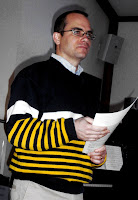 This morning we celebrated a baptism, toward which Pastor Brad directed his opening remarks on a Sunday morning both chilly and sunny, the baptism of Keegan Michael Clark.
This morning we celebrated a baptism, toward which Pastor Brad directed his opening remarks on a Sunday morning both chilly and sunny, the baptism of Keegan Michael Clark."God is pursuing Keegan even now," Brad said before turning his opening comments to today's theme. "We sing surrender songs, but we have parts of our lives where we want to run from God. It is a matter of willfulness vs. willingness." And we were warmly welcomed.
Announcements included the following:
1) The next women's Bible study will be February 27. Brad conveyed the message that last Friday's study was great, and it's not too late to join us.
2) "Dr. Leonard" stood to note that Feb. 14 is our Valentine's Banquet. Put it on your calendars.
3) Paula indicated that there is a church calendar on the wall by the kitchen where all church activities should be noted. This will help in organizing our church year.
4) The Secret Friends sign up sheets are still available for all women who wish to participate.
 The Worship Team led us in a number of songs to prepare us for today's message, which was followed by today's baptism, which Pastor Brad explained was a "visible sign of covenant making."
The Worship Team led us in a number of songs to prepare us for today's message, which was followed by today's baptism, which Pastor Brad explained was a "visible sign of covenant making."Pastor became quite emotional during the baptism, reflecting on the innocence of youth and how challenging life can be later. "There are tough things coming... we need to pray for our little ones." It was a very moving ceremony as he displayed the newly baptized Keegan up and down the aisle.
The offering was taken and today's Scripture reading conducted.
Psalm 62:5-12
Mark 1:14-20
After a time of prayer for needs in the church, the sermon commenced.
Surrender Daily
Brad noted that there will be a time when we pray one of two prayers; either, "Not my will but Yours be done," or "God, not your will, but mine be done." He proceeded to draw upon events from the life of Moses to bring alive his message.
Moses was born during a time when the Pharaoh of Egypt decreed that all male children must be thrown into the river. As "chance" would have it, Moses was placed in a basket at three months of age and floated downstream. The Pharaoh's daughter found him and raised him as her own son, naming him Moses, which means, "I drew him out of the water."
Raised as he was in Pharaoh's house gave him a Golden Boy outlook on life. He was "Destiny's Child." He had power and a future. But he was aware that he was a Hebrew and still felt an identification with his people. On one occasion he saw an Egyptian beating a Hebrew and decided something must be done. After looking this way and that, Moses took advantage of the isolated opportunity and killed the Egyptian, hiding the body and evidence of his wrongdoing.
His intentions may have been good, but instead of looking left and right he should have looked up. Did he pray before taking such extreme action? Did he acknolwedge his dependence on God?
In the midst of this story Brad noted how children are quite cute in infancy, but at age two or so they discover a new word: "No!" It's a willfulness that seems part of our nature. God gave us a will, the ability to make choices. The problem is when we want our way, our will, even if it hurts others or even contradicts God's will.
The endpoint toward which the sermon directed us was this simple prayer: "Thy will be done." In a quick summation Brad applied this to several areas of our lives.
In the workplace, some of us are in jobs where we spend our lives in "impression management." Often making a good impression is at the expense of others. In church many are aware of the importance of tithing, but haven't made an effort to move toward this spiritual discipline. Even simple things, like who gets to use the armrest on an airplane or who will yield in a discussion to allow the other to speak, we're exerting our wills or submitting to one another in love.
We begin to bring joy to God's heart when we say, "Not my will, but Thine be done. Our willfulness or decision to become willing needs to be made today.







